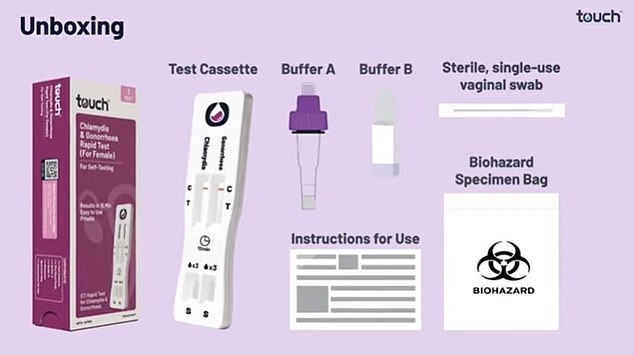The first self-test kits for gonorrhea and chlamydia will be delivered to millions of Australians amid a “worrying” rise in cases.
The kits, recently approved by the Therapeutic Goods Administration, will be sold in pharmacies and online in the coming weeks.
The tests, which are designed only for women, can return a result for sexually transmitted infections (STIs) in just 15 minutes.
The diseases are detected by a single swab sample in the kits, which are produced by Sydney diagnostic test manufacturer Touch Biotechnology.
CEO Matt Salihi said the kits will prevent the spread of STIs and protect the privacy of women who can now test in a comfortable environment.
“This marks significant progress in improving options for women’s sexual health in Australia, with the hope of reducing the number of infections that go undiagnosed and allowing more people to receive appropriate and timely treatment,” she said.
“We hope it empowers women to take the first step toward receiving a diagnosis.”
Before the at-home testing option, women were required to take a lab or PCR test, which can be expensive and also invasive for some patients.
First gonorrhea and chlamydia self-test kits to be distributed to millions of Australians amid ‘worrying’ rise in cases (stocks)

First self-test kits (pictured) can detect two different infections in just 15 minutes
One in six Australians will contract an STI in their lifetime, according to federal government data amid a “concerning” rise in STI diagnoses.
Gonorrhea rates have soared by 157 per cent and chlamydia rates by 26 per cent, with more than 110,000 cases reported in Australia last year.
Common signs of gonorrhea among women are pain and discomfort in various parts of the body, including the throat and eyes.
These symptoms can often be confused with other infections and fear of judgment and stigma can prevent some Australians from getting tested.
Touch Biotechnology general manager Matt Gencer said if STIs are left untreated among women, they can cause major health problems.
“That’s why it’s incredibly important for women to get tested for STIs when they’re experiencing even the slightest symptoms or when they’re concerned about their partner’s sexual activity,” Mr. Gencer said.


